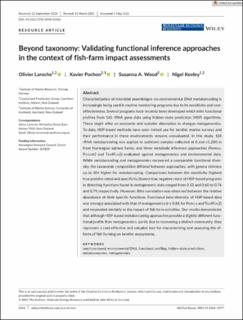| dc.description.abstract | Characterization of microbial assemblages via environmental DNA metabarcoding is increasingly being used in routine monitoring programs due to its sensitivity and cost-effectiveness. Several programs have recently been developed which infer functional profiles from 16S rRNA gene data using hidden-state prediction (HSP) algorithms. These might offer an economic and scalable alternative to shotgun metagenomics. To date, HSP-based methods have seen limited use for benthic marine surveys and their performance in these environments remains unevaluated. In this study, 16S rRNA metabarcoding was applied to sediment samples collected at 0 and ≥1,200 m from Norwegian salmon farms, and three metabolic inference approaches (Paprica, Picrust2 and Tax4Fun2) evaluated against metagenomics and environmental data. While metabarcoding and metagenomics recovered a comparable functional diversity, the taxonomic composition differed between approaches, with genera richness up to 20× higher for metabarcoding. Comparisons between the sensitivity (highest true positive rates) and specificity (lowest true negative rates) of HSP-based programs in detecting functions found in metagenomic data ranged from 0.52 and 0.60 to 0.76 and 0.79, respectively. However, little correlation was observed between the relative abundance of their specific functions. Functional beta-diversity of HSP-based data was strongly associated with that of metagenomics (r ≥ 0.86 for Paprica and Tax4Fun2) and responded similarly to the impact of fish farm activities. Our results demonstrate that although HSP-based metabarcoding approaches provide a slightly different functional profile than metagenomics, partly due to recovering a distinct community, they represent a cost-effective and valuable tool for characterizing and assessing the effects of fish farming on benthic ecosystems. | en_US |
